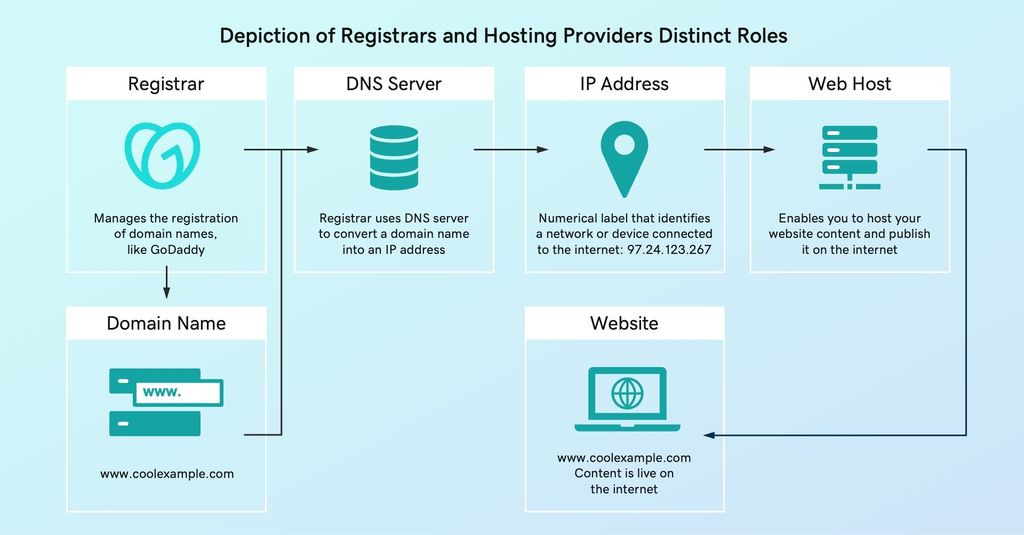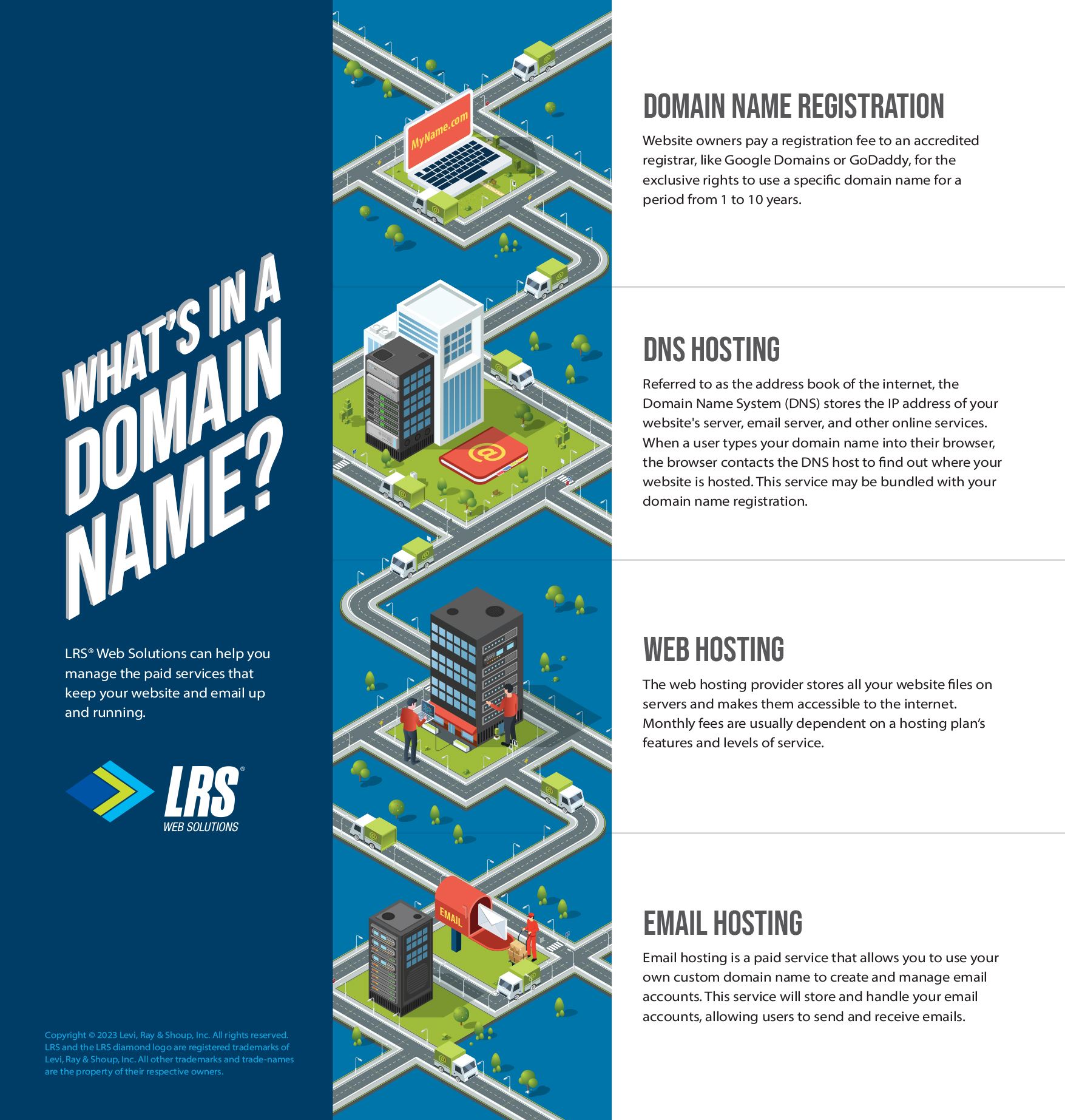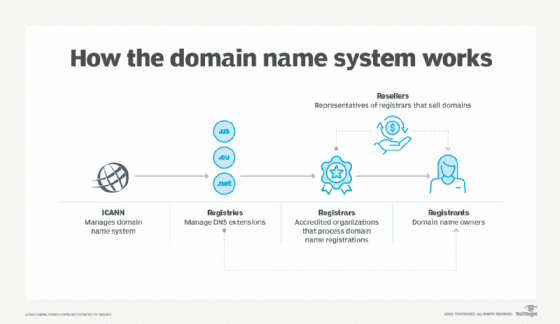
Registration Domain Name & Web Hosting: Your Ultimate Guide
Domain name registration involves securing a unique web address. Web hosting provides storage space for your website on a server.
 |
| Registration Domain Name And Web Hosting |
Choosing the right domain name and web hosting service is crucial for your online presence. A domain name serves as your website's address, making it easy for users to find you online. Web hosting, on the other hand, stores your website's files on a server, ensuring it is accessible on the internet.
Both elements are essential for building a successful website. Opt for a domain name that is short, memorable, and relevant to your business. Select a web hosting provider that offers reliable uptime, fast loading speeds, and excellent customer support. Investing in these services can significantly impact your website's performance and user experience.
Choosing A Domain Name
Choosing the perfect domain name is crucial for your online presence. It represents your brand, impacts SEO, and influences how visitors perceive you. The right domain name can attract more traffic and build trust with your audience.
Brainstorming Ideas
Start with a brainstorming session to generate domain name ideas. Here are some tips:
- Think about your brand's key message.
- Consider your target audience.
- Use keywords related to your business.
- Keep it short and memorable.
- Make sure it’s easy to spell.
Use tools like Google Keyword Planner or Answer The Public to find popular keywords. Write down all the ideas that come to mind. Then, narrow down the list to the best options.
Checking Availability
Once you have a list of potential domain names, check their availability. Many tools can help you with this:
| Tool | Website |
|---|---|
| Exonhost | domain.com |
| GoDaddy | godaddy.com |
| Namecheap | namecheap.com |
Enter your chosen names into these tools. They will tell you if the domain is available. If it’s taken, they may suggest alternatives or different extensions.
Be sure to check the domain’s history. Use tools like Wayback Machine to see the past content of the domain. Avoid domains with negative history or poor reputation.
After ensuring availability and a clean history, select the best domain name. Register it promptly before someone else does domain.com
Domain Name Extensions
Choosing the right domain name extension is crucial. It impacts your website's visibility. A domain name extension is the suffix at the end of a web address. Examples include .com, .org, and .net. Each serves different purposes and audiences.
Popular Extensions
Some extensions are more domain.com than others. Here are a few:
- .com: Ideal for commercial businesses. It's the most recognized extension.
- .org: Used by non-profits and organizations.
- .net: Often used by technology or network companies.
These extensions are well-known and trusted. They help build credibility for your site.
Specialized Extensions
Specialized extensions cater to niche markets. They can make your website stand out. Here are some examples:
- .edu: For educational institutions.
- .gov: Reserved for government entities.
- .biz: Targeted at businesses and enterprises.
- .blog: Perfect for bloggers and writers.
Using a specialized extension can attract a specific audience. It shows the focus of your website.
Registering A Domain
Registering a domain is the first step in building your online presence. A domain name is your website’s unique address on the web. It should be easy to remember and reflect your brand or business. Below, we will cover how to select a registrar and the registration process.
Selecting A Registrar
Choosing the right registrar is crucial. A registrar is a service that manages the reservation of internet domain names. Look for these qualities in a registrar:
- Reputation: Check reviews and ratings.
- Pricing: Compare costs of domain registration and renewal.
- Customer Support: Ensure they offer 24/7 support.
- Additional Services: Look for services like email hosting.
- Security: Ensure they provide domain privacy protection.
Registration Process
The registration process is simple and involves a few steps:
- Search for a Domain Name: Use the registrar’s search tool to find available names.
- Select Your Domain: Choose a name that best fits your brand.
- Add to Cart: Add the chosen domain to your cart.
- Provide Contact Information: Enter your details for WHOIS records.
- Choose Registration Duration: Select the number of years for your registration.
- Review and Pay: Confirm your details and make the payment.
Once registered, you will receive a confirmation email with your domain details. Keep this information safe.

Credit: www.godaddy.com
Types Of Web Hosting
Choosing the right web hosting is crucial for your website. Different types of web hosting offer various features. Here, we will explore the main types of web hosting.
Shared Hosting
Shared Hosting is a popular choice for beginners. It is affordable and easy to manage. Your website shares server resources with other websites.
- Cost-Effective: Shared hosting is budget-friendly.
- Easy Management: Hosting provider handles server maintenance.
- Limited Resources: Resources are shared among multiple websites.
Shared hosting is ideal for small websites or blogs. It provides a simple setup and basic features. It is a good starting point for new webmasters.
Dedicated Hosting
Dedicated Hosting offers an entire server for your website. It ensures higher performance and security.
| Feature | Benefit |
|---|---|
| Exclusive Resources | Full server resources for your site. |
| Higher Security | Better protection from threats. |
| Greater Control | Complete control over server settings. |
Dedicated hosting is perfect for high-traffic websites. It suits businesses needing robust performance and security. It's more expensive but offers unmatched control and reliability.
Selecting A Web Hosting Provider
Choosing the right web hosting provider is crucial for your online success. The right provider ensures your website is fast, secure, and always accessible. Here are some key factors to consider when selecting a web hosting provider.
Key Features To Look For
There are several essential features to look for in a web hosting provider. The right features will ensure your website runs smoothly.
- Uptime Guarantee: Aim for 99.9% or higher uptime.
- Speed: Fast loading times enhance user experience and SEO.
- Security: Look for SSL certificates and DDoS protection.
- Customer Support: 24/7 support can resolve issues quickly.
- Scalability: Ensure the hosting plan can grow with your website.
Comparing Providers
Comparing web hosting providers helps you find the best fit. Here's a table comparing some popular providers:
| Provider | Uptime | Speed | Security | Support | Scalability |
|---|---|---|---|---|---|
| HostA | 99.9% | Fast | High | 24/7 | Excellent |
| HostB | 99.8% | Moderate | Medium | 24/7 | Good |
| HostC | 99.7% | Fast | High | Business Hours | Excellent |
Evaluate these factors to make an informed decision. The right provider will meet your website's needs efficiently.

Credit: www.lrswebsolutions.com
Setting Up Your Website
Setting up your website is a crucial step. It helps establish your online presence. It involves configuring DNS and installing a CMS. Let's dive into these steps.
Configuring Dns
DNS stands for Domain Name System. It translates your domain name to an IP address. This makes your site accessible on the web.
To configure DNS:
- Log in to your domain registrar.
- Navigate to the DNS settings.
- Add or modify the DNS records. Use the provided IP address.
Here are common DNS record types:
| Record Type | Purpose |
|---|---|
| A Record | Points to an IP address. |
| CNAME | Aliases one name to another. |
| MX Record | Directs email to your mail server. |
Installing A Cms
A CMS, or Content Management System, makes it easy to build websites. Popular CMS options include WordPress, Joomla, and Drupal.
To install a CMS:
- Download the CMS package from the official site.
- Upload the package to your web hosting server.
- Run the installation script. Follow the on-screen instructions.
WordPress is the most popular CMS. It offers many themes and plugins. These help you customize your site without coding.
Setting up your website involves several steps. Each step is crucial for a smooth online presence. Follow the guidelines and enjoy your new site!
Maintaining Your Domain And Hosting
Maintaining your domain and hosting is crucial for your website's success. Regular updates ensure smooth operation and protect your online presence. Here, we discuss renewing your domain and upgrading hosting plans.
Renewing Your Domain
Your domain name is your online identity. It needs timely renewal to remain active. Missing a renewal can result in losing your domain. This can disrupt your online presence.
Steps to Renew Your Domain:
- Log into your domain registrar account.
- Navigate to the domain management section.
- Select the domain you want to renew.
- Choose the renewal period (one year, two years, etc.).
- Complete the payment process.
Tips for Domain Renewal:
- Set up automatic renewals to avoid expiration.
- Keep your contact information updated.
- Watch out for renewal reminders via email.
Upgrading Hosting Plans
As your website grows, you might need more resources. Upgrading your hosting plan ensures better performance and speed.
Reasons to Upgrade Your Hosting Plan:
| Reason | Benefits |
|---|---|
| Increased Traffic | Handles more visitors without slowdowns |
| Better Security | Advanced security features for protection |
| Enhanced Features | Access to more tools and resources |
Steps to Upgrade Your Hosting Plan:
- Log into your hosting provider account.
- Go to the hosting management section.
- Select the current hosting plan.
- Choose the desired upgraded plan.
- Complete the payment process.
Maintaining your domain and hosting ensures your website's stability and growth. Regular renewals and timely upgrades keep your online presence strong.
Troubleshooting Common Issues
Domain registration and web hosting can sometimes face issues. Fixing these problems quickly is essential. Here are some common issues and how to troubleshoot them.
Domain Not Resolving
If your domain is not resolving, it means users can't reach your website. This issue is often related to DNS settings.
- Check DNS Records: Ensure your DNS records are correct.
- Propagation Time: DNS changes may take up to 48 hours.
- Clear Cache: Clear your browser and DNS cache.
Use online tools to check DNS propagation status. Make sure your domain points to the correct server.
Website Downtime
Website downtime can affect your site’s traffic. Here are steps to address it.
- Check Server Status: Verify if your hosting server is running.
- Inspect Error Logs: Look at your server’s error logs for clues.
- Resource Limits: Ensure you are not exceeding resource limits.
Consider contacting your hosting provider if downtime persists. They can provide more detailed information and support.
Future Trends
The digital landscape is always changing. With new technologies, domain registration and web hosting are evolving rapidly. This blog post explores the future trends in these areas.
Emerging Domain Extensions
New domain extensions are becoming popular. Traditional extensions like .com and .net are still common. But new extensions like .tech, .store, and .blog are gaining traction.
These new extensions can be more specific. They help businesses stand out. For example:
- .tech for technology companies
- .store for e-commerce sites
- .blog for personal blogs
Using a relevant extension makes your site memorable. It also improves branding.
Advancements In Hosting Technology
Web hosting is advancing fast. Cloud hosting is now very popular. It offers scalability and reliability. No more worrying about server downtimes.
SSD storage is another big trend. It provides faster data access. Websites load quicker, improving user experience.
Many hosts now offer CDN services. Content Delivery Networks distribute your content globally. They ensure fast loading times for users everywhere.
Here is a table summarizing the key advancements:
| Technology | Benefits |
|---|---|
| Cloud Hosting | Scalability, reliability |
| SSD Storage | Faster data access |
| CDN Services | Global content delivery |
These advancements make websites faster and more reliable. They improve the overall user experience.

Credit: www.techtarget.com
Frequently Asked Questions
What Is Domain Registration And Web Hosting?
Domain registration secures your website's name. Web hosting provides space on a server for your site's files. Both are essential for a website.
How Do I Register A Domain Name And Host It?
To register a domain, choose a name and use a domain registrar. Purchase hosting from a reliable provider. Connect your domain to the hosting service by updating DNS settings. Install a website platform like WordPress. Your site is now ready to go live.
Does Domain Registration Include Hosting?
No, domain registration does not include hosting. They are separate services. You need to purchase hosting separately.
What Is The Difference Between Hosting And Domain Registrar?
A domain registrar manages domain name reservations. Hosting provides server space for your website files and makes them accessible online.
Conclusion
Choosing the right domain name and web hosting is crucial for your online success. It impacts your site's performance and visibility. Make an informed decision to ensure a strong online presence. Invest time in research to find the best options.
Your website's future depends on these foundational choices.
You can connect with us: Facebook Page ।। Facebook Group
If your have any quarry or would like to know more about the above information, please comment and share to give others the opportunity to learn as well.

0 Comments: